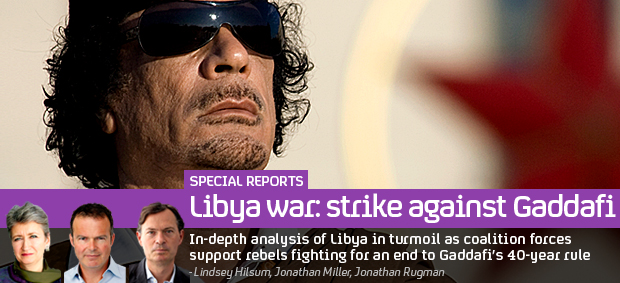Navy chief: Prolonged Libya effort unsustainable
The head of the Royal Navy warns the fleet will not be able to continue its current scale of operations beyond the summer, as the US House of Representatives votes to prohibit funding of the conflict.

Admiral Sir Mark Stanhope, the First Sea Lord, said the navy had planned for a six-month commitment in Libya and the government must make “challenging decisions” about what it wanted to do after.
In a briefing at Admiralty House, Stanhope said: “How long can we go on as we are in Libya? Certainly – in terms of Nato‘s current time limit that has been extended to 90 days – we are comfortable with that.
“Beyond that we might have to request the government to make some challenging decisions about priorities,” Stanhope said.
“There are different ways of doing this. It’s not simply about giving up standing commitments, we will have to rebalance,” he continued.
He also said elements of the operation would have been cheaper and “much more reactive” if the scrapped aircraft carrier HMS Ark Royal had been available, rather than flying planes from the Italian base at Gioia del Colle.
The comments reopened controversy over the Government’s strategic defence review cuts, but Sir Mark insisted he was not calling for the decision to axe the vessel and its Harrier jump jets – part of wide-ranging cuts to the armed forces announced last year – to be reopened.
“Do I feel bitter? No. It’s a reality of where we are. I keep saying this. We have to look forward and go for what is in the pipeline, which I have already indicated is challenging enough. There is far too much about what could have been as opposed to what is,” Stanhope said.
The navy and RAF suffered disproportionately from the SDSR, having to cut 5,000 jobs each, as well as losing ships and aircraft.
Liam Fox, the Defence Secretary, said: “Operations in Libya are showing how capable we are post-SDSR as a leading military power with the fourth largest defence budget in the world.
“We continue to have the resources necessary to carry out the operations we are undertaking and have spare capacity with the Royal Navy taskforce, which is currently on exercise in the Gulf.
“The SDSR is not being reopened. The Harrier has served with great distinction over a long period and in a number of theatres, but we are not bringing them back into service.
“Our planning assumptions remain valid and we have been able to effectively conduct missions over Libya. We are now progressing with the disposal of the Harrier force.”
US House of Representatives
Meanwhile, the US House of Representatives has voted to prohibit the use of funds for US military operations in Libya.
Politicians adopted the amendment to a military appropriations bill by a vote of 248 to 163 late on Monday.
A number of members of Congress have expressed their dissatisfaction at President Obama’s decision to go ahead with operations in Libya in March and to continue without congressional authorisation.
According to US law, the President must seek congressional authorisation to send US troops into combat and must withdraw the forces within 60 days if Congress has not authorised the military action.
But politicians must still approve the appropriations bill as a whole and the measure must still be approved by the Senate.
It came during heavy fighting on several fronts in Libya. Rebel fighters said they were making gains towards Zlitan from Misrata, edging closer to the capital Tripoli.
But on Monday rebel forces said Gaddafi troops killed at least 25 of their fighters on the eastern frontline between Ajdabiya and Brega.
